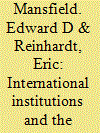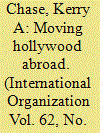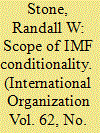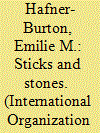|
|
|
Sort Order |
|
|
|
Items / Page
|
|
|
|
|
|
|
| Srl | Item |
| 1 |
ID:
084823


|
|
|
|
|
| Publication |
2008.
|
| Summary/Abstract |
In recent years, there is growing interest in the study of cross-national policy convergence. Yet we still have a limited understanding of the phenomenon: Do we observe convergence of policies at all? Under which conditions can we expect that domestic policies converge or rather develop further apart? In this article, we address this research deficit. From a theoretical perspective, we concentrate on the explanatory power of three factors, namely international harmonization, transnational communication, and regulatory competition. In empirical terms, we analyze if and to what extent we can observe convergence of environmental policies across twenty-four industrialized countries between 1970 and 2000. We find an impressive degree of environmental policy convergence between the countries under investigation. This development is mainly caused by international harmonization and, to a considerable degree, also by transnational communication, whereas regulatory competition does not seem to play a role.
|
|
|
|
|
|
|
|
|
|
|
|
|
|
|
|
| 2 |
ID:
084825


|
|
|
|
|
| Publication |
2008.
|
| Summary/Abstract |
During the past half-century, states have established a large number of international trade institutions, both multilateral and regional in scope. The existing literature on this topic emphasizes that these agreements are chiefly designed to liberalize and increase the flow of overseas commerce. Yet such institutions have another function that has been largely ignored by researchers, namely, reducing volatility in trade policy and trade flows. Exposure to global markets increases the vulnerability of a country's output to terms of trade shocks. Governments seek to insulate their economies from such instability through membership in international trade institutions, particularly the World Trade Organization (WTO) and preferential trading arrangements (PTAs). We hypothesize that these institutions reduce the volatility of overseas commerce. We further hypothesize that, because market actors prefer price stability, trade institutions increase the volume of foreign commerce by reducing trade variability. This article conducts the first large-scale, multivariate statistical tests of these two hypotheses, using annual data on exports for all pairs of countries from 1951 through 2001. The tests provide strong support for our arguments. PTAs and the WTO regime significantly reduce export volatility. In so doing, these institutions also increase export levels.
|
|
|
|
|
|
|
|
|
|
|
|
|
|
|
|
| 3 |
ID:
084826


|
|
|
|
|
| Publication |
2008.
|
| Summary/Abstract |
Theories of trade and domestic politics have been applied extensively to manufacturing and agriculture; the political economy of trade in services, however, remains poorly understood. This article examines how the "offshoring" of services segments labor markets and places low-skilled and high-skilled labor at odds on trade issues. Drawing from a case where trade has been politically contentious of late-motion picture services in the United States-the article finds that offshoring can aggravate wage inequality, creating incentives for low-skilled workers to demand policy remedies. Consistent with this expectation, an ordered probit analysis of labor-group lobbying reveals that low-skilled occupations in motion picture services were most likely to support countervailing duties and Section 301 action against productions filmed abroad. The findings suggest that when services are tradable, labor-market cleavages are not purely factoral or sectoral, but occupational. This new politics of trade in services has important implications for trade policy in the United States and multilateral rulemaking in the World Trade Organization.
|
|
|
|
|
|
|
|
|
|
|
|
|
|
|
|
| 4 |
ID:
084824


|
|
|
| 5 |
ID:
084827


|
|
|
|
|
| Publication |
2008.
|
| Summary/Abstract |
"Naming and shaming" is a popular strategy to enforce international human rights norms and laws. Nongovernmental organizations, news media, and international organizations publicize countries' violations and urge reform. Evidence that these spotlights are followed by improvements is anecdotal. This article analyzes the relationship between global naming and shaming efforts and governments' human rights practices for 145 countries from 1975 to 2000. The statistics show that governments put in the spotlight for abuses continue or even ramp up some violations afterward, while reducing others. One reason is that governments' capacities for human rights improvements vary across types of violations. Another is that governments are strategically using some violations to offset other improvements they make in response to international pressure to stop violations.
|
|
|
|
|
|
|
|
|
|
|
|
|
|
|
|
|
|
|
|
|